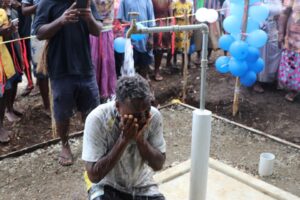BY MIKE TUA
AS an environmental reporter for the Sunday isles newspaper for the past 8 months and with a temporary job cancellation, social uncertainty, and economic hardship due to the impact of the pandemic, it felt like everything is at a standstill.
That is why 27-year-old John Charisma of Guadalcanal province decided to continue with his vegetable garden, which he had created in 2017 at the New Zealand Camp’s Settlement Area, Central Guadalcanal.
The reason he opted to concentrate on his vegetable garden was to not only help his family (wife and son) through the tough times of the pandemic but to also continue his love for agriculture farming and garden life.
“Before, we didn’t know we could make money from the garden and did it for fun. But if there are markets and land, there’s money,” said John Chrisma.
He described that he had acquired his gardening skills and knowledge from his parents back in the rural village. “I initially got into gardening when I was still a kid in the primary. My family got into gardening actively,” recalls John. “Working in the garden empowered me because I was previously a student and unemployed, and now I have to make an income in such challenging times.”
John has concentrated on practicing an organic style of gardening and has grown a variety of vegetables, including saladia, lettuce, ball cabbage, tomatoes, eggplant, and pakchoi.
“Initially, I grow vegetables for my family’s consumption and to generate income and the garden is organic (no fertilizers used, only topsoil), and no pesticides are applied. I deal with pests physically; I handpicked insects, African snails, and caterpillars, during night and day.
“I usually fetch water from borehole and ground well to water my vegetables – early in the morning (7-8 am and evening 5-6 pm, when it’s cool,” he explained.
John explained that the specific stages of a vegetable plant nursery, transplant, and harvest. “The plant nursery and transplant phase is 2-3 weeks respectively, and it takes exactly 6-7 weeks to ensure it is fully grown and ready to harvest.”
John and wife often harvest the vegetables for formal marketing at the Honiara Central Market and whatever is left over is for consumption. The couple recently moved from subsistence vegetable gardening to income-generation, which they earn between $1000 and $2000 a month.
“This garden means so much for me and my family’s survival especially with the current negative social and economic climate experienced in the country,” said John. “If I can grow a vegetable garden for cash, healthy diet, and to give out (freely) to friends, and neighbors, that is my definition of food, social and economic security.”
The vegetable garden has not only improved the livelihood of John’s family but also provided some employment in the community, as he employs about 5 youths who assist with the watering and ploughing of the garden on days when the couple are particularly busy. They pay a casual charge (per person) for watering the garden at $ 5-00 and $10.00 for ploughing.




